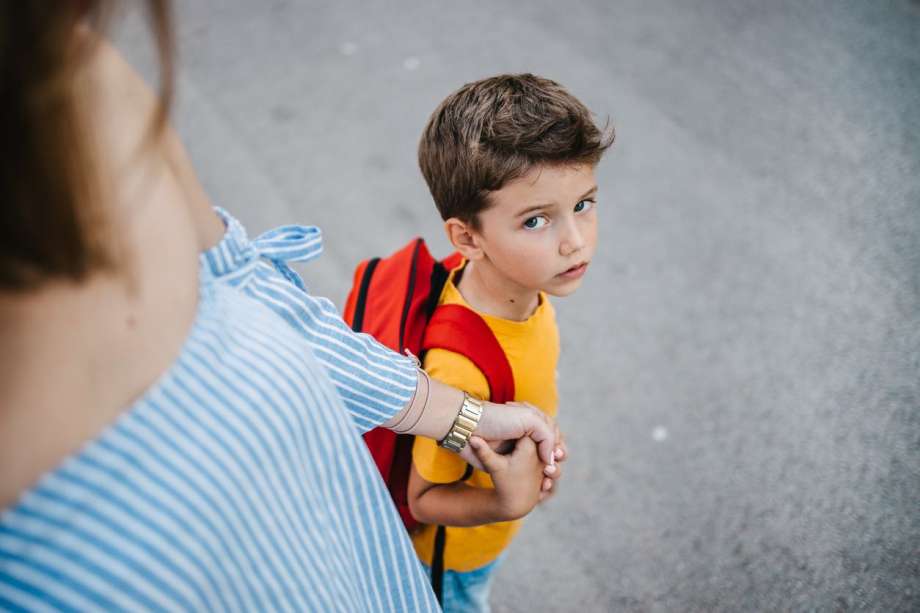How to Help Kids with Back-to-School Anxiety

It’s fairly common for young children to experience some level of separation anxiety when they first go off to school, particularly if they have been home with a parent until the start of Kindergarten. Older children might experience anxiety at the start of school or when entering middle school or high school.
The coronavirus pandemic adds a new level of anxiety for many children, including fears of becoming ill at school or anxiety about returning to in-person education without masking requirements, which most states have relaxed.
Some kids might experience social anxiety, and re-acclimating to socializing with friends and peers without masks may prove to be challenging for some children. What’s more, with recent school shootings in the U.S., some kids may even fear for their physical safety as they return to school.
As a parent, you may be wondering how you can help your child process any anxiety or fears about returning to school. This article contains tips and strategies from experts designed to make back-to-school drop-off and first-day jitters a little bit easier for both you and your child.
Related: 5 Positive Phrases to Say to You Anxious Child About School
Talk About Their Feelings

One of the best things you can do for your child’s well-being is to openly discuss their feelings. Helping children process and cope with their feelings makes them feel safe and helps them learn healthy coping strategies in a supportive environment.
Education Reform: How Will it Affect Your Child?
Education Reform: How Will it Affect Your Child?It's not easy getting a handle on education reform. For one thing, the term means different things to different people. For another, it impacts students differently from one state, city, or school to the next. Given those limitations, what can parents expect to see happening as education reform takes hold? Read More
Not all children know how to put a name to what they are experiencing. Pay attention to cues and signals that your child might be anxious, such as withdrawal, complaints of stomachaches, headaches, a change in eating habits, a change in bathroom habits, mood swings, or temper tantrums.
One way to broach the topic with both older and younger children is to state observation and ask an empathetic question, for example, “You’ve been very quiet today, is there something you are feeling anxious or nervous about?” or “I heard you slam your door earlier. Is something making you angry?” You can also use movies or books that address anxiety as a way to broach the topic with your child.
Visit the School Together
If your child is transitioning to a new school or you have recently moved, call your child’s school to see if you can set up a visit ahead of time. Many schools host a meet & greet each year where students can visit, meet their teacher, and bring in their school supplies.
Even if your child has been going to the school for a few years, taking them to see their new classroom and meet their new teacher is fun and exciting, and it will stir up some enthusiasm about the start of a new school year.
You can also talk together about how to address any fears they might have. For example, if your child is nervous about making friends at school, you can brainstorm some ideas together about how to make friends with their classmates, such as setting up a playdate or connecting with other children in your neighborhood.
Have a First Week Plan

Have a back-to-school routine planned for the first week of school. Talk to your child about what the first week back to school is going to look like, and pay attention to any signs of social anxiety or other stress your child might be feeling.
You may wish to practice the routine ahead of time so that the first day isn’t a mad rush to make it to the school bus on time. Coming off a summer of playdates and free time is difficult for children, and let’s be honest, the change in routine is tough on us too!
The more something is practiced, talked about, and prepared for, the better one feels, so don’t be afraid to start early!
Create a Drop-off Routine
Whether it is preschool or high school, the first day of school causes anxiety for younger and older children alike. One of the best ways to help anxious preschool and elementary school-aged children through the transition is to create a drop-off routine.
There are a few basic components to a drop-off routine that educators recommend:
- Consistency: Consistency helps children feel safe and can relieve anxiety. Develop a consistent send-off routine with your child. It could be a high five and a kiss, or a hug and you waving as they drive away on the bus. Plan it together, and then stick to it daily.
- Short and Sweet: Prolonged goodbyes are much more challenging because your child will continue to crave more. If your child tries to get one more hug or kiss, remind them of the routine, “We said three kisses, and then daddy leaves. I gave you your three kisses, so now it’s time for you to walk into the building. I’ll see you after school!”
- Do NOT come back after saying goodbye: This is a tough one for sure, especially if we hear our kids crying or they were clinging to us as we left. But the simple fact is, when you go back, you reinforce to your child that tantrums and crying make you stay. If you feel anxious and upset, call the school or child care about 5 minutes after leaving. In most instances, your child will already be engaged in the day and calmed down.
- Crying is okay: Know that your child might cry, and there’s nothing wrong with that. Teachers and caregivers are skilled at helping children calm down when they experience separation anxiety, so trust that they will do their job. Maybe you’re going to cry too, and that’s okay! We can make space for all emotions, both happy and sad.
- Use a transition object (if needed): Some children will benefit from a transition object. It could be a small stuffed animal they keep in their backpack or a picture of their parents, siblings, or favorite family member. Sometimes just knowing they have that object close is enough to get over the jitters.
Back-to-School COVID Concerns

The return to school in 2022 has a new set of fears and worries kids never had to face before. To help your child prep for the new school year, here are a few COVID-specific tips:
- Talk to your child’s pediatrician about ensuring they’re up to date on vaccinations, including the COVID-19 vaccine
- Answer any questions your child might have about the COVID-19 vaccine
- Discuss and practice handwashing and good hygiene
- Talk about wearing a mask and practice if your child has not worn one much
- Discuss any fears or concerns your child may have
- Create space for your child to ask questions, but don’t forget to focus on the positive
- Find a supportive outlet for any anxiety you experience as a parent, and avoid expressing your anxieties to your child
When to Seek Extra Support for Your Kid's Anxiety
Some amount of school anxiety is normal, but when should you get help from a mental health professional? If your child shows consistent signs of anxiety, like physical symptoms, not getting enough sleep, and consistent school refusal, it might be time to talk to an expert.
Talking to your pediatrician is a great place to start. A mental health expert can also tell whether your child has an anxiety disorder or some other reason for their feelings. Childhood anxiety can be stressful, but it’s very treatable. Don’t hesitate to seek support if you have concerns.
For more tips on how to help kids ease the back-to-school transition, see our 7 Tips to Managing School-Related Anxiety.

